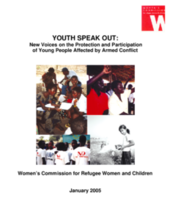In January 2000, the Women’s Commission for Refugee Women and Children (Women’s Commission) released the report Untapped Potential: Adolescents Affected by Armed Conflict, which described some achievements and major gaps in support for the rights of refugee, internally displaced, returnee and other adolescents in emergencies and post-conflict situations. The product of desk research, Untapped Potential identified rights abuses adolescents regularly suffer in armed conflict and displacement precisely because of their age and gender amid a diverse range of social, economic, political, cultural and historical circumstances. It identified these young people as “the underserved of the underserved,” with little attention paid to their rights or roles in humanitarian or reconstruction work and few lessons documented or shared on how best to improve their lives. It also described the devastating consequences of this neglect.
The Women’s Commission followed this work with a series of field-based, action-oriented studies designed and led by adolescent research teams to build on the findings of Untapped Potential. In all, more than 3,000 adolescents, youth and adults in Kosovo, northern Uganda and Sierra Leone participated in these studies, and many of them became involved in intensive follow-up advocacy and related youth-led programs. Young people interviewed their peers about a range of issues to answer questions central to this research: What are the main problems of adolescents in your society? What are some solutions to these problems? What is adolescence, and how does someone become an adult in your society? The young researchers also worked closely with adults and adult-run nongovernmental, governmental and United Nations organizations, whose representatives helped them logistically, participated in interviews and later used the young people’s results to shape policies and programs. The achievements and comparative findings of these efforts are presented here, in Youth Speak Out: New Voices on the Protection and Participation of Young People Affected by Armed Conflict.
The Women’s Commission undertook this work as part of an ongoing campaign to improve services and protection to adolescents affected by armed conflict and persecution by increasing knowledge and targeted program and policy action for change. Findings in Youth Speak Out also draw on preliminary research undertaken in Thailand with refugees from Burma and a study with refugee children and adolescents from Afghanistan working in harmful labor conditions in urban Pakistan. The report is further informed by the Women’s Commission’s work with young people in international and regional conferences, including the Winnipeg Conference on War-affected Children (2000) and the United Nations Special Session on Children (2002).
Youth Speak Out provides new information and practical ideas generated by young people themselves for further coordinated advocacy and immediate action for and with young people affected by armed conflict based on experience gained about what is needed and what works. It is for decision-makers at all levels: governmental and other donors; United Nations headquarters and field representatives; international and local nongovernmental organizations (NGOs); adolescents and youth; academics; and others with responsibility or concern for refugee young people. It shows how actions many of these groups have taken so far with and for young people affected by armed conflict have made significant constructive differences in their protection and well-being and that of their communities. It also identifies the serious gaps that remain. It describes how young people view their own protection environment. Their diverse perspectives point to the need for a new conceptual framework informed by them, explaining why and how refugee young people’s rights should be supported. Finally, Youth Speak Out identifies specific and practical steps that can and should be taken now to expand on good program experiences and improve on policy guidelines for young people’s protection and care. Supporting the rights of adolescents and youth, especially their participation, is not only an obligation, it is essential good practice.
©Women's Commission for Refugee Women and Children

